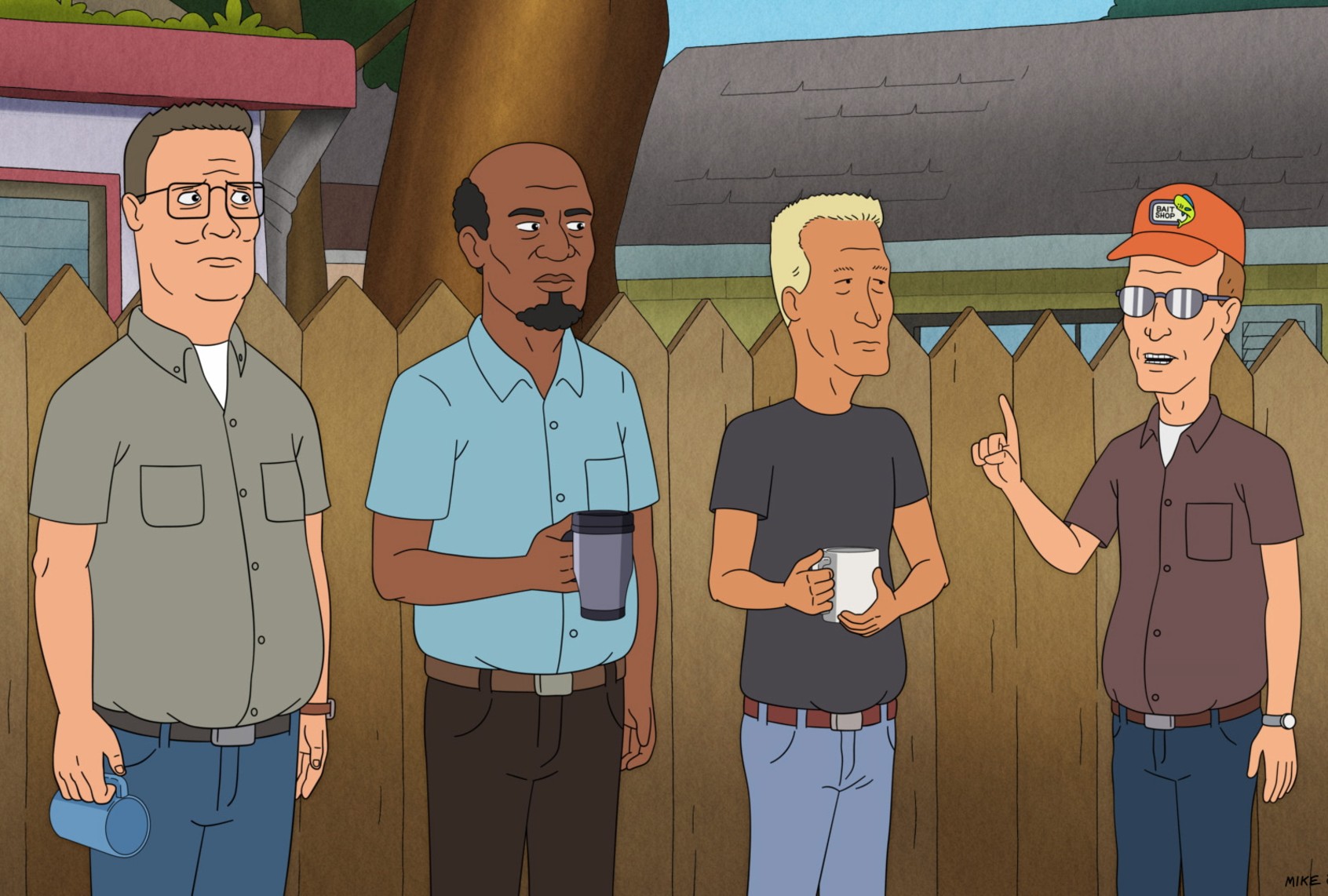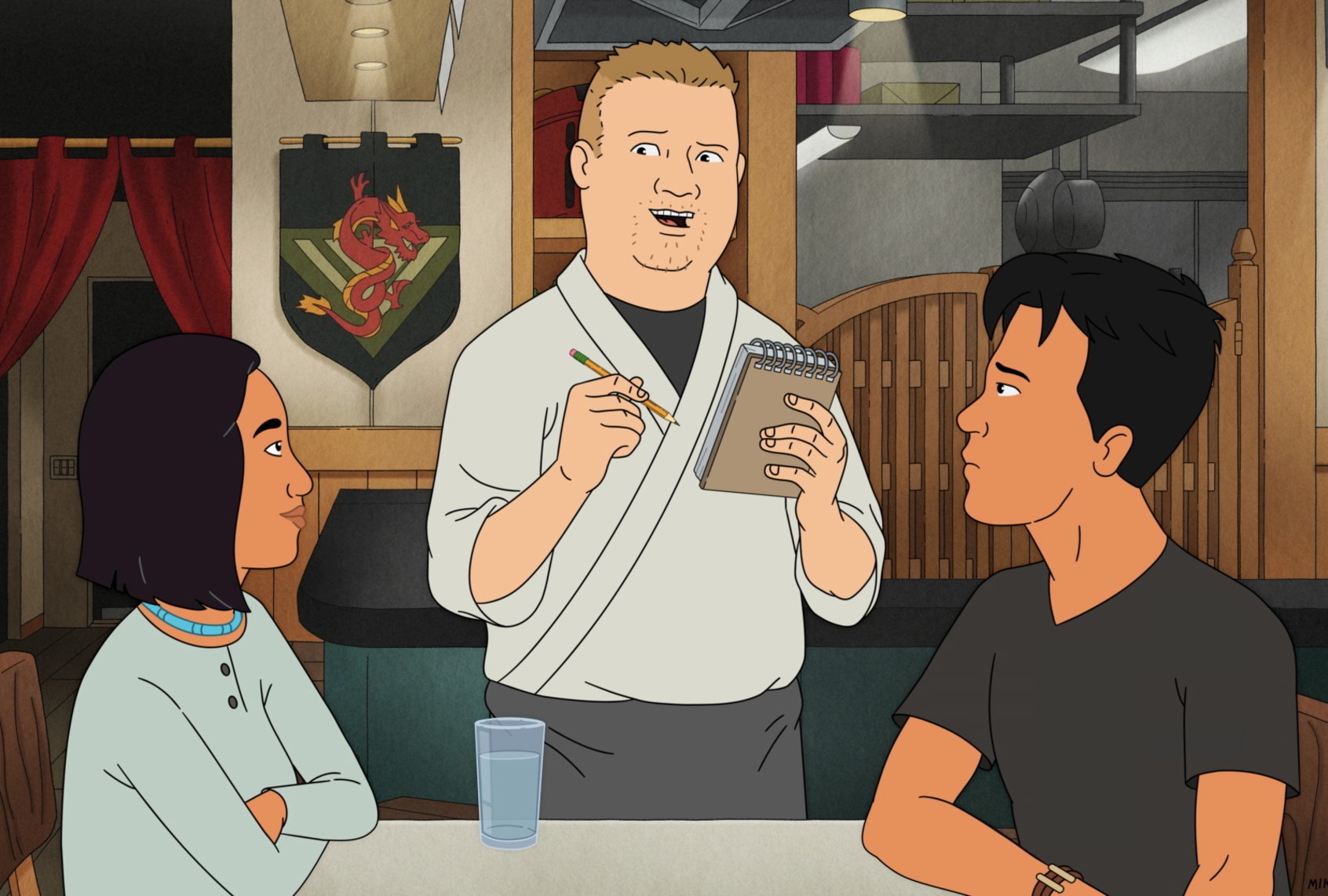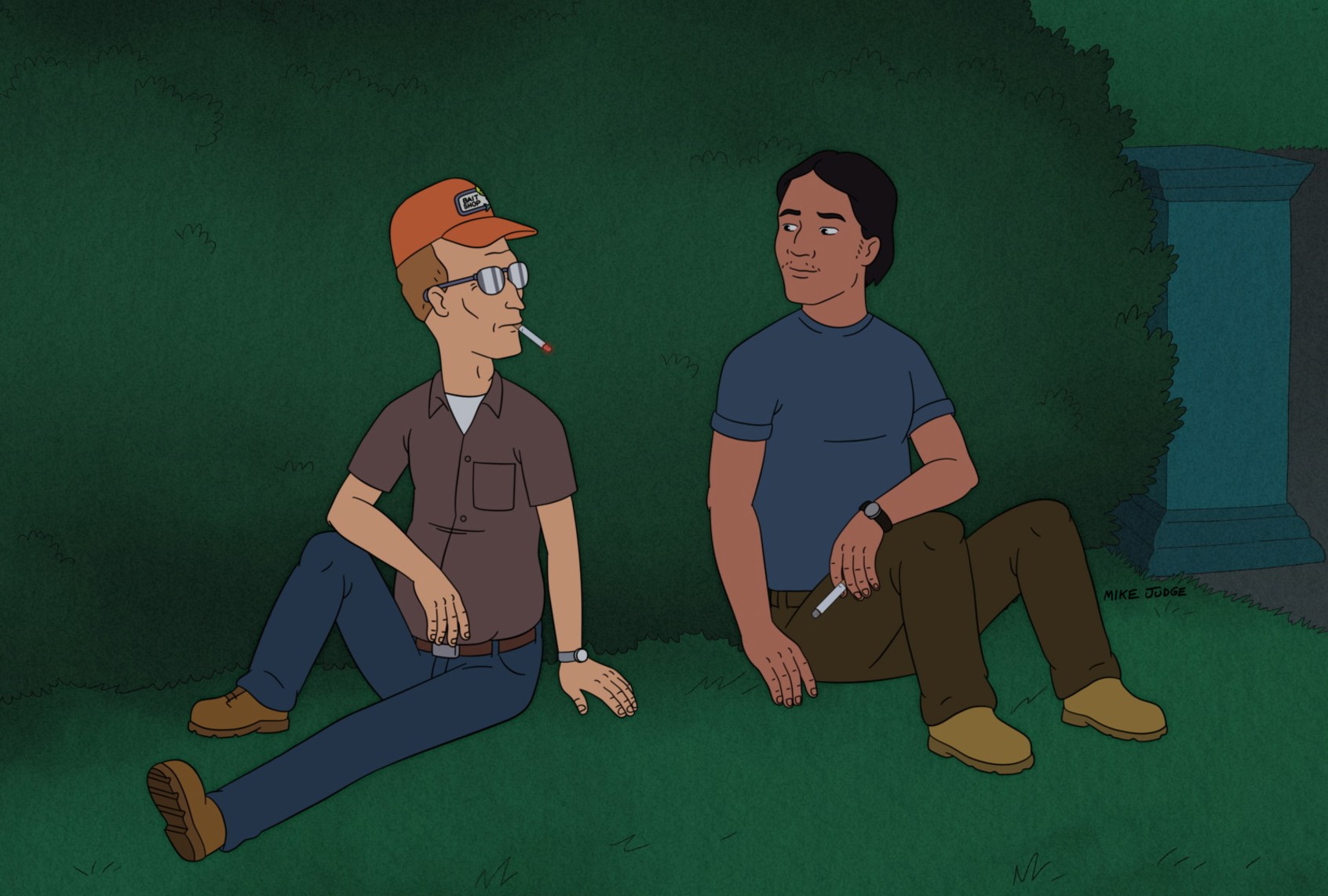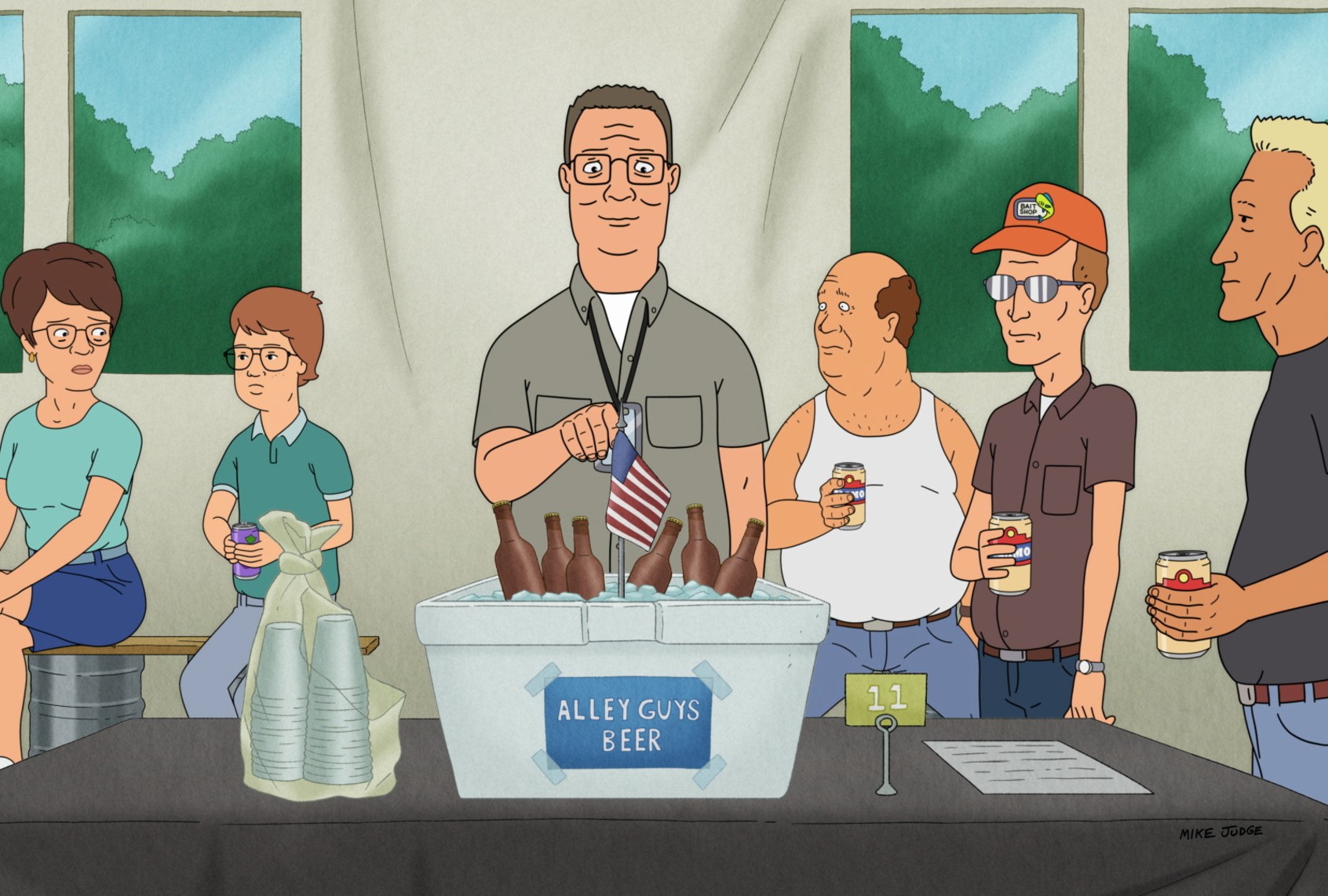Once Hulu confirmed the “King of the Hill” revival was officially moving forward, it didn’t take long for the Internet to wonder how Hank Hill would have voted in the previous three elections. Speculations have varied from hard yeses to a rainbow of bargaining; maybe in 2016, but definitely not in 2020 or 2024. Some believe Hank, a Lyndon B. Johnson fan, may have voted for Joe Biden in 2020. But a woman as president? That’s a lot to ask of a Hill.
Mike Judge and Greg Daniels built their two-dimensional Texas Everyman to ensure we could never quite be certain. The Hank Hill we came to know during the original 1997-to-2010 run of “King of the Hill” is a registered Republican, but the party he knew has long gone extinct.
Hank is proudly set in his ways, but also profoundly honorable, a decent man perpetually out of step with the times.
“If Hank votes Republican, it’s because, as a voter who cares about religious and rural values, he probably doesn’t see much choice,” Matt Bai theorized in a 2005 New York Times story. “But Hank and his neighbors resemble many independent voters, open to proposals that challenge their assumptions about the world, as long as those ideas don’t come from someone who seems to disrespect what they believe.”

(Disney/Mike Judge) “King of the Hill”
The Hank Hill we came to know during the original 1997-to-2010 run of “King of the Hill” is a registered Republican, but the party he knew has long gone extinct.
From the perspective of two decades after Bai wrote that, it’s hard not to wonder whether liberals would have a better sense of what was coming if more had paid attention to this show. That wouldn’t have been a hard task.
Regardless, here we stand. These days, it’s natural to have doubts about anyone we think we know. Maybe they’ll continue to despite Judge, Daniels and new showrunner Saladin K. Patterson’s thoughtful decision to entirely remove Peggy and Hank from America and an argument bound to end in no place good.
The “King of the Hill” premiere catches up with Hank and Peggy returning to Arlen, Texas, 15 years after we last saw them, much of that spent living on an American compound in Saudi Arabia. In the kingdom that oil built, Hank sold and installed propane and propane accessories while Peggy lived like a midcentury American sitcom wife. The version of America to which they return, where rideshares and all-gender bathrooms are now the norm, baffles them.
That Hank is confused, not horrified, immediately allows our shoulders to drop a bit. Even if America’s moral and psychological center has shifted closer to their neighbor Dale Gribble’s paranoia flood zone, Hank and Peggy’s hasn’t. They’re still stubbornly kind-hearted and determined to reach some understanding without falling into step with the world’s madness.
Late 20th century animated series that have withstood changes in taste and time have by and large rooted themselves in a politically neutral America. The Springfield we see on “The Simpsons” could be any of the towns bearing that name. Quahog, Rhode Island, home to “Family Guy,” is an Anyplace, U.S.A., not bound to the rules of gravity and common sense.
The same is true of South Park, Colorado, but the show bearing its name eschews objectivity in favor of punching every which way. That said, Trey Parker and Matt Stone have always made extraordinary exceptions for political targets needing to be taken down a peg — if not entirely, as recent episodes show.
“King of the Hill” camps out somewhere on the rich land between, acknowledging an exurban populace bound to a set of values supposed “elites” might scoff at. But if one were to remove the veil of snobbery and suspicion dividing urban and rural America, one would find a lot more Hanks and Peggys in the world than far-right trolls.
If such a thing as middle ground still exists, Arlen is where you’d find it – a place where immigrants, Black and Indigenous folks co-exist with white neighbors who don’t pretend they don’t see them differently. And yet, many also practice the human tendency of feigning blindness concerning topics too unpleasant to confront directly. The biggest is a snickering joke that’s run since the show began: the obvious, dubious parentage of Dale’s brown-skinned son Joseph (Tai Leclaire), who looks a lot like that Gribble family’s Native American friend, John Redcorn.

(Disney/Mike Judge) “King of the Hill”
If one were to remove the veil of snobbery and suspicion dividing urban and rural America, one would find a lot more Hanks and Peggys in the world than far-right trolls.
Much has happened in the 15 years since “King of the Hill” ended its run on Fox. America went from having elected its first Black president to putting an orange dictator in office twice. A pandemic placed a years-long pause on happy hour socializing with friends and colleagues. Loneliness became an epidemic. Our sense of unity, whether it was ever real, has fractured.
Still, the necessary constants remain. Judge still voices Hank, with Kathy Najimy returning as Peggy, now a retired substitute Spanish teacher who barely grasped the language. (Her similar belief in her Arabic mastery is shattered when she tries to chat with a native speaker upon their return from the place she calls “Saw-dye Arabia.”)
Pamela Adlon’s friendly raspiness still defines Bobby, who has outgrown his father’s “That boy ain’t right” expectations to become the executive chef of a Japanese-German fusion restaurant he co-owns. Hank is proud of his son’s entrepreneurial spirit and work ethic. What he doesn’t know is that Bobby’s grilled dishes are cooked using the devil’s charcoal.
We need your help to stay independent
“King of the Hill” confronts progressive and right-wing stereotypes with care and equanimity. Achieving this in a cultural environment as riven as ours would seem to be more difficult, yet none of the humor feels strained.
These new episodes navigate politically charged topics without delving into the specifics of the politics that gave rise to them. Episodes confront issues like cultural appropriation and the manosphere’s misogynistic sales pitch with a similar heart, humor and evenhandedness that the writers apply to app-enabled NIMBY behavior and younger generations’ tendency to overshare.
“King of the Hill” confronts progressive and right-wing stereotypes with care and equanimity. Achieving this in a cultural environment as riven as ours would seem to be more difficult, yet none of the humor feels strained.
In every instance, Hank and Peggy, but mainly Hank, wriggle in their discomfort before settling into a kind of peace with whatever occurs. And the writers always find the sweetest ways to do that, as when Hank finds out his new retirement hobby as a handyman comes with the expectation of free therapy from his younger clients. What could have been reduced to jokes about Millennial solipsism instead asks him to reckon with his emotional constipation. In the end, everyone lets go a little bit more.

(Disney/Mike Judge) “King of the Hill”
The extent to which the Hills care for their neighbors is evidenced by what the neighborhood became without them. While they were in the Middle East, their tenant Brian Robinson (Keith David) joined Boomhauer (Judge), Dale and Bill Dauterive (Stephen Root) for alley beers, but his company wasn’t enough to keep Bill from spiraling.
While Bobby followed his dream, his best friend Connie Souphanousinphone (Lauren Tom) went to college, giving Hank and Peggy’s nemeses Kahn (now voiced by Ronny Chieng) and Minh (also Tom) something else to lord over them since Hank Hill’s son chose not to.
Start your day with essential news from Salon.
Sign up for our free morning newsletter, Crash Course.
Life being unpredictable, and time cruel, there are missing loved ones. There’s no mention of Hank and Peggy’s niece Luanne Platter, who was originally voiced by the late Brittany Murphy. The same goes for Tom Petty, who passed away in 2017 and voiced Luanne’s love, Lucky Kleinschmidt. Johnny Hardwick recorded Dale’s voice for a few episodes before he died in 2023. Toby Huss takes over the remainder of the season.
We’re also reminded of what Jonathan Joss brought to the show as John Redcorn. He recorded his part before he was shot to death in June in San Antonio, Texas. Law enforcement officials are weighing whether the suspect, Sigfredo Ceja Alvarez, should be charged with a hate crime; Joss’ husband, Kern de Gonzales, said in a Facebook post that the pair were “harassed regularly by individuals who made it clear they did not accept our relationship.”
Such violence is a dark reminder of what happens when a nation yearns to go backward.
“King of the Hill,” then and now, offers another respite to these omnipresent fears without ignoring the cultural tensions disturbing us. It reminds me of the long-held dictum that animated series can get away with plots that their live-action counterparts either can’t or struggle to enact convincingly. But instead of rubberizing reality, this colors in its community with understanding and empathy, reminding us there are plenty of places that haven’t forgotten, as a Girl Scout selling cookies puts it, that it’s nice to be nice.
“King of the Hill” streams Monday, August 4 on Hulu.
Read more
about animated series


